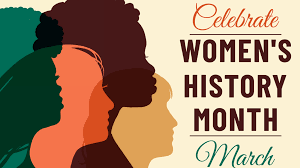
This March commemorates the 36th annual National Women’s History Month across the United States.
In 1980, after a few years of growing popularity across several state’s legislations, President Jimmy Carter issued the first Presidential Proclamation declaring the first week of March as Women’s History Week. However, state-by-state action of adopting the entire month of March for Women’s History built up momentum until February 1987, when Congress declared the entire month of March as National Women’s History Month.
What is National Women’s History Month, you ask? It is an entire month dedicated to recognizing and celebrating women’s contributions to our nation’s history. I’m sure that trailblazing names in history are crossing your mind now; names such as Rosa Parks, Ruth Bader Ginsburg, Susan B. Anthony, Hillary Clinton, and Sojourner Truth pop up at the mere mention of women’s history. Women who battled men to change history for the future of all women, regardless of race or age. This year, the National Women’s History Alliance—the organization behind lobbying to Congress for national recognition of women’s achievements beginning in 1980—has declared the 2023 theme of National Women’s History Month to be “Celebrating Women Who Tell Our Stories.”
This year, UA Little Rock joins the National Women’s History Alliance in their mission of leading and promoting Women’s History; committed to the goals of education, empowerment, equality, and inclusion, and placing the spotlight on those women who came before us to tell our stories and sway sympathy and empathy to the women’s plight.
The point is “to encourage the recognition of women, past and present, who have been active in all forms of media and storytelling to include print, radio, television, stage, screen, blogs, podcasts, news, and social media,” according to the National Women’s History Alliance. Even from our earliest days, women who wanted a place in media history have had to fight for respect, recognition, and equal treatment, whether in journalism, public relations, film, television, radio, advertising, or any other media venue. However, in the past three centuries, trailblazing women have successfully broken the glass ceiling, forging their way into positions once only held by men.
Therefore, as we leave you with thoughts of all the women trailblazers who came before us, we also leave you with a short list of storytellers who have led profound change in media since they took their first step in front of a camera:
Barbara Walters became the first news anchorwoman on any American network in 1976, continuing her career as a newswoman for five decades, winning 12 Emmy awards for her reporting. Learn more about her unsurpassed career.
Oprah Winfrey was the first woman to own and produce her own talk show. In 1986, Winfrey founded Harpo Productions and by 1988, she held all the rights to her daytime television talk show, the Oprah Winfrey show, which ran successfully from 1985 through 2011. Learn more about Oprah and her many other firsts.
Maya Angelou became the first woman to write and perform a poem at a presidential inauguration in 1992, where she recited “On the Pulse of the Morning” for President Bill Clinton’s swearing-in ceremony. Learn more about Angelou’s trailblazing.
Ariana DeBose became the first openly queer woman of color to win an Academy Award for playing the role of Anita in 2022’s production of West Side Story. Learn more about this trailblazer.
As you look for ways to celebrate Women’s History Month, please consider attending AR Girls Lead hosted on March 8th at the Clinton Presidential Center and the Arkansas Council for Women in Higher Education (ACWHE). They will host their Annual Conference (virtually) this Friday, March 3rd, 9am – Noon. Registration for UA Little Rock participants has already been covered (free to attend, no payment required).